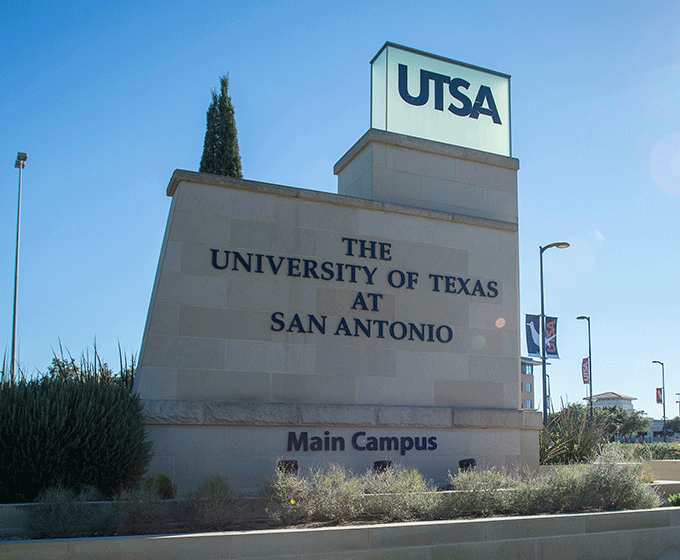
AUGUST 15, 2024 — Beginning this fall, UTSA will embark on a transdisciplinary effort to bring together intellectually diverse researchers by strategically hiring clusters of faculty scholars to augment existing UTSA expertise in six key areas.
This effort will allow UTSA to grow its research enterprise, create new knowledge and further position itself as a Tier One public research university. During the 2024-2025 faculty recruitment cycle, the university anticipates hiring 26 scholars in the following areas:
These focus areas are the outcome of the Clustered and Connected Hiring Program (CCP), which is a program within the university’s Strategic Faculty Hiring Initiative. Since 2019, the CCP has been the mechanism to recruit and hire researchers in targeted areas addressing some of today’s most significant challenges.
Notably, these new cluster hires will be funded in part by The University of Texas System Board of Regents' Research Excellence Program, which was created to help UTSA and other Emerging Research Universities within the UT System recruit researchers to dramatically grow their national prominence and federal funding opportunities.
UTSA will receive an allocation from the UT System that is expected to result in about 40 new faculty positions over the next several years. Its intent is to attract new, mid- to senior-level faculty who will add expertise in research areas that will enhance competitiveness, help solve societal needs and advance the university’s capacity to meet UT System and state goals as outlined by the Texas Legislature.
“UTSA has experienced great success using the clustered and connected hiring process to assemble diverse groups of remarkable scholars dedicated to collaborating in new and exciting ways to drive genuine transdisciplinary innovations,” said Heather Shipley, UTSA provost and executive vice president for Academic Affairs. “We are grateful to the UT System for this dedicated funding to hire additional research-focused faculty in areas that will enhance UTSA’s competitiveness and align our capabilities with research opportunities from federal agencies.”
The CCP process engages current UTSA faculty members to propose concepts for the concurrent hiring of multiple positions across colleges. In February, Academic Affairs and the Office of Research asked UTSA faculty to submit proposals for transdisciplinary cluster hires. It received 29 proposals.
A collaborative group comprised of members from the Office of Research and Academic Affairs, including the college deans, reviewed the proposals.
Submissions were evaluated on many factors, including the ability to enhance national or international preeminence and campus leadership in a priority area; multi-college, cross-disciplinary composition and diversity of backgrounds and perspectives; ability to increase funding to meet UT System and State goals; and ability to concretely link together existing scholarly and program capacities along with demonstrated commitment to utilizing collaborative and convergent research approaches.
“The quality of each proposal was outstanding,” said JoAnn Browning, UTSA interim vice president for UTSA of Office of Research. “These clusters exhibit a strong transdisciplinary focus and align seamlessly with federal funding priorities. We look forward to being able to recruit additional exceptional researchers from transdisciplinary fields to help innovate, discover, and enact impactful work for our communities.”
UTSA’s Strategic Faculty Hiring Initiative includes five complementary programs that provide support mechanisms for academic colleges to recruit and hire some of the best and brightest minds with unique backgrounds and experiences, providing intellectual prowess to help the university address society’s grand challenges.
The Clustered and Connected Hiring Program builds upon past faculty cluster hiring initiatives which focused on strengthening UTSA’s expertise in analytics and data sciences, artificial intelligence, brain health, cybersecurity, human performance, quantum information science, social and environmental challenges in Latin America and virtual and augmented reality.
UTSA Today is produced by University Communications and Marketing, the official news source of The University of Texas at San Antonio. Send your feedback to news@utsa.edu. Keep up-to-date on UTSA news by visiting UTSA Today. Connect with UTSA online at Facebook, Twitter, Youtube and Instagram.
Covidence is a systematic & scoping review tool used to streamline the process of screening and reviewing articles. Using this software, research teams can easily import studies, perform automatic deduplication, and extract data using templates. This workshop will show attendees how to start a review in Covidence, add collaborators, and get started on screening.
Virtual (Zoom)In this workshop, attendees will be introduced to Pandas, a Python tool for working with data easily. It makes it simple to organize and analyze information when data is organized and categorized, like spreadsheets or tables.
Group Spot B, John Peace LibraryEach fall and spring semester, students convene at the Main Campus at UTSA with booths, ideas and prototypes. A crowd of judges, local organizations, students, faculty and sponsors walk around and talk to the students about their projects and ask questions. Students get the real-life experience of "pitching" their project with hopes of getting funding or support to move to the next level.
UTSA Convocation Center, Main CampusJoin the doctoral candidates for the Doctoral Conferreal Ceremony and celebrate their accomplishments.
Arts Building Recital Hall, Main CampusCelebrate the graduates from the Carlos Alvarez College of Business, College of Education and Human Development, Margie and Bill Klesse College of Engineering and Integrated Design and University College.
AlamodomeCelebrate the graduates from the College for Health, Community and Policy, College of Liberal and Fine Arts and College of Sciences.
AlamodomeThe University of Texas at San Antonio is dedicated to the advancement of knowledge through research and discovery, teaching and learning, community engagement and public service. As an institution of access and excellence, UTSA embraces multicultural traditions and serves as a center for intellectual and creative resources as well as a catalyst for socioeconomic development and the commercialization of intellectual property - for Texas, the nation and the world.
To be a premier public research university, providing access to educational excellence and preparing citizen leaders for the global environment.
We encourage an environment of dialogue and discovery, where integrity, excellence, respect, collaboration and innovation are fostered.